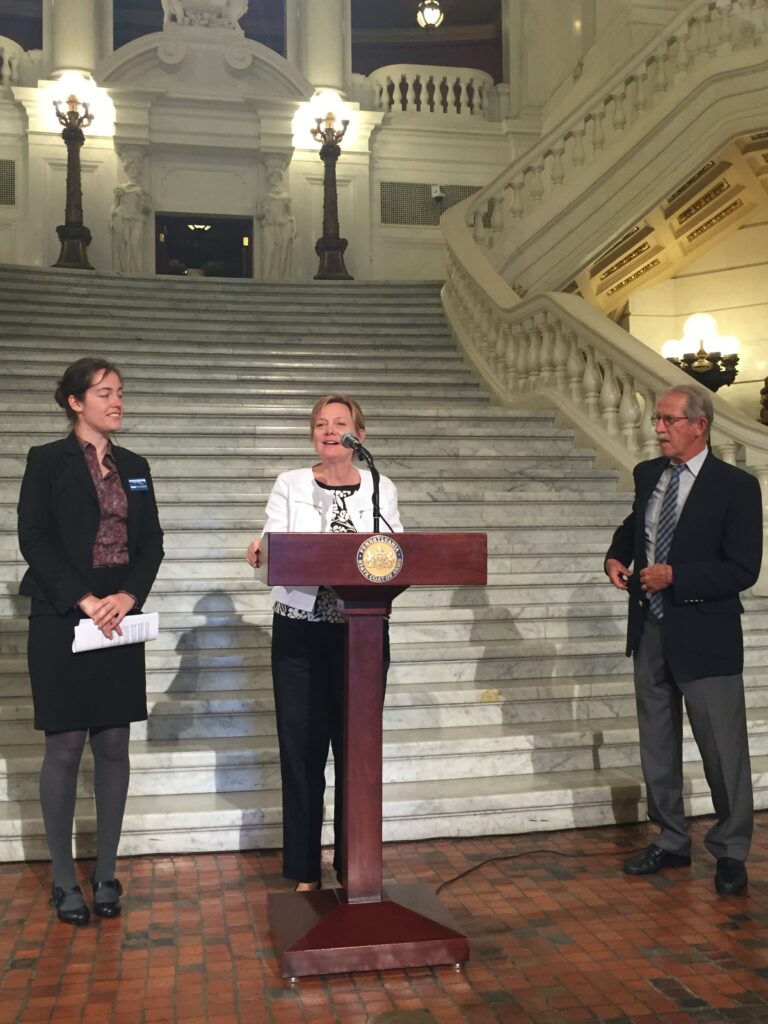As the federal government considers weakening federal air quality and global warming emissions standards, air pollution remains a threat to public health in communities across Pennsylvania, according to a new national report.
“This report shows that our communities – around our nation and right here in Pennsylvania — are struggling to breathe,” LAMPa director Tracey DePasquale said at a capitol news conference unveiling the report. “The air, which is to be life-giving, is for some, death-dealing. And climate change is only going to make this worse.”
The report by the Frontier Group, PennEnvironment Research & Policy Center and Pennsylvania Public Interest Research Group Education Fund found the following levels of degraded air days in 2016, increasing the risk of premature death, asthma attacks, and other adverse health effects:
-
In Lancaster, 539,137 people experienced 179 days of degraded air quality in 2016, equaling almost 1 out of every 2 days.
-
In Harrisburg, 568,008 people experienced 132 days of degraded air quality in 2016, equaling more than 1 out of every 3 days.
-
In Pittsburgh, 2,341,536 people experienced 121 days of degraded air quality in 2016, equaling about 1 out of every 3 days.
-
In the Philadelphia region, 6,077,152 people experienced 111 days of degraded air quality in 2016, equaling about 3 out of every 10 days.

Read the full report and see how your community fares.
“Today, science shows us what the poets and prophets knew: That all of this earthly Creation breathes together. The seas, the trees, every living thing is part of an elegant exchange that sustains life on this planet,” said DePasquale. “When one part is choking, it is a sign that another will soon be gasping for breath.”
“People have a right to clean air. They have a right to go outside and enjoy their neighborhood without worry that the air will make them sick or trigger an asthma attack, said Pittsburgh Councilwoman Deb Gross. “People in my own district have been impacted by industrial pollution, right in their own backyards. We, as a region, need to get serious about protecting public health.”
For the report, Trouble in the Air: Millions of Americans Breathe Polluted Air, researchers analyzed U.S. Environmental Protection Agency (EPA) records of air pollution levels across the country, focusing on smog and particulate pollution – harmful pollutants that come from burning fossil fuels such as coal, diesel, gasoline and natural gas.
“As people of faith, we believe that breath of God which gives life also calls us and sends us forth with power to heal. By our personal choices as consumers and creators, and by our choices as citizens, we can do just that,” said DePasquale. “From planting trees and changing lightbulbs, to weatherizing our buildings and those of our neighbors, and finally, switching to cleaner sources of energy, we are attempting to be better stewards of the breath that we have been given.
“This report is one more call to action – to policies that support the changes we are already trying to make. As Pennsylvania citizens, we can support bi-partisan legislation that would set us on a path toward the goal of 100 percent renewable energy by 2050 and we can tell our lawmakers – both state and federal – that now is not the time to hit the brakes on safeguards to the air we breathe. Sustainability requires sustained effort from all of us.”
“Ozone pollution and particle pollution are two of the most widespread and dangerous air pollutants,” said Dr. Robert Little, President of Harrisburg Physicians for Social Responsibility. “Breathing these pollutants can cause asthma attacks, respiratory and cardiovascular harm, and even early death.”
“High ozone and particulate matter in our outdoor air makes breathing harder and puts stress on our hearts and lungs,” said Dr. Walter Tsou, Executive Director of Philadelphia Physicians for Social Responsibility. “We have to clean up the air because you can’t tell people to stop breathing.”
“There’s no safe level of exposure to smog and particulate pollution,” said Elizabeth Ridlington, Policy Analyst with Frontier Group and co-author of the report. “Even low levels of smog and particulate pollution are bad for health and can increase deaths.”
These troubling findings come at a time when the White House prepares to weaken the federal clean car standards, a critical program to cut global warming emissions and increase fuel efficiency.
The report’s authors called on the federal government to strengthen, not weaken, the clean car standards and continue to allow states to adopt stronger vehicle pollution standards. The authors also called on EPA to strengthen ozone and particulate pollution standards.
“Invisible and some visible substances infiltrate our homes and negatively impact our children as they play,” said Salena King of Moms Clean Air Force. “Whether they are on the playgrounds or sport fields across the nation, we must implement stricter sanctions to protect our most vulnerable and precious citizens.”
“Our children are counting on us to be good stewards of the environment, said Rep. Scott Conklin (D-Centre). “We must continue to strive every day to improve the quality of the air that we breathe, the water that we drink and to conserve the resources that we have in abundance for future generations.”





